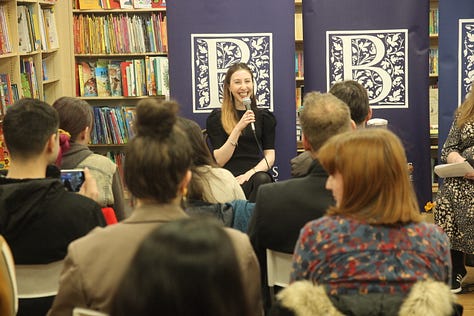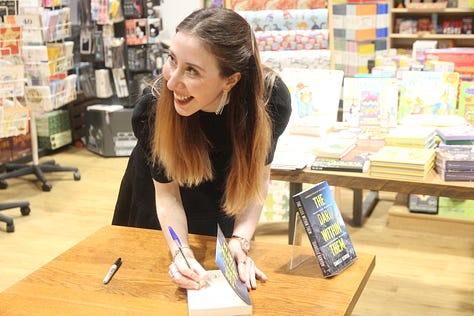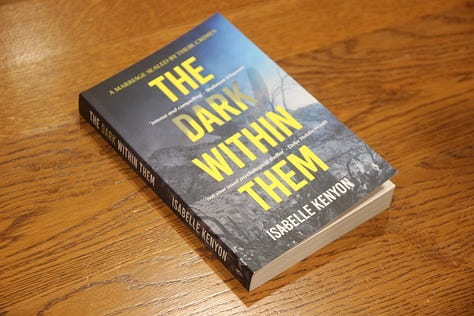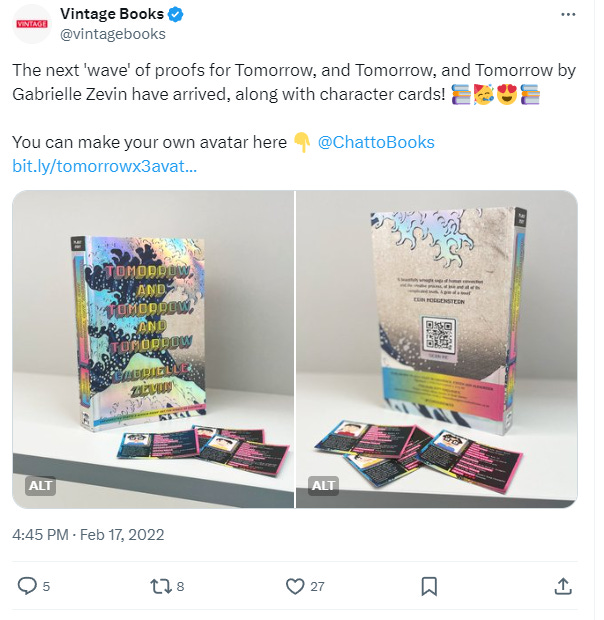The Real Rebels of the Book World and the Booksellers helping us
Indie Publishers: Fighting the Good Fight
Happy Friday Scribblers,
This newsletter is an afternoon one because I have been resting sore eyes post laser eye surgery! It was a struggle to stay offline yesterday with the launch of The Dark Within Them! We’re currently on a blog tour, and I’ve been blown away by the reviews so far:
“The fact that this is a debut novel just honestly blows my mind, it's so well written. The pacing was perfect and the mystery behind it all just has you on the edge of your seat... Amber was such an interesting main character who you wanted to protect but also shake to make her realise what was happening to her and her family.” - Emmie, oncemorewithreading



“Using a dual narrative between Amber and Chad the story of their ill-fated marriage unfolds cleverly with a beautifully constructed narrative that drips feeds its readers with a smattering of clues here and there. And yet all the way through there is a chilling undercurrent of iniquity.” - Gill, Bookphace
Read a sample of the ebook here and grab a copy of the paperback from us here or all good bookshops online and in person now! (Signed copies in Waterstones Arndale and Deansgate Manchester, and Leeds under Crime…)
I recently attended a meeting with fellow independent publishers to discuss the challenges we're facing and how we might band together to support one another. There were publishers who have been around for thirty years, such as the fantastic Saraband, in attendance, who said these were the worst conditions they had seen for publishers. Ever.
Now Fly on the Wall heads into our sixth year, and it has never felt easy, but I hope that if this is rock bottom, things will get easier. I’m holding on for that. Our commitment to bringing diverse narratives to readers remains unwavering. I want to fill you in one aspect of the conversation, with contributes to much indie publisher exhaustion today.
The Mounting Administrative Burden
We indie publishers are swamped with administrative tasks that are eating away at our bandwidth for promoting our books. A major culprit? There is a rising expectation from bookstores to provide paperback proofs for every single title we publish. (In the past, not all books would see a paperback proof run - digital copies sufficed, and trees and costs were saved).
A relationship of sending advance paperback proofs to booksellers is one of friendship over several years (learning tastes, gaining feedback, gaining trust and, of course, taking records of all conversations), of cost (print and postage costs have gone through the roof!) and of competition (the sending of a proof for a publisher such as Penguin Random House is something completely different to what an indie publisher can offer a bookseller - it is a courting, complete with numerous free gifts.)
Let’s unpack these elements and why indie publishers are struggling with this changing system.
What is a paperback proof, and why do we print them?
Maria Vassilopoulos, global sales manager at University of Wales Press, archivist for SYP UK and Book Society UK and book trade historian, said:
‘The first proofs of books in the British book trade can be dated back to the early 1600s. The job of ‘proofing’ in the publishing process originates from the days of the letterpress printing method where a ‘galley’ or metal tray was lined up with the type, and then a small number of copies of the text would be printed on what was called a ‘proof press.’ This was done so that the printer could check the typesetter had properly set the copy and also see if any of the letters were damaged. If they passed the test, a copy would be sent to the author and the editor for final checking. By the mid-nineteenth century, publishers were able with the new technology of an automated printing press to produce large quantities of books at once, and authors were sent several proof copies to check and approve before the final version of their book was printed. This abundance also allowed booksellers and reviewers from newspapers and trade magazines such as The Bookseller to be sent copies to include in their book round-ups. Booksellers would also mark up changes they thought needed to be made and send proofs back to the publishers, and although they were never meant to sell them, this rule was often broken.’
These days, we usually opt to say ‘proof’ rather than ‘galley’. So what does a successful proof campaign look like?
Going with the video game aspect of the book, Vintage here created a video game box for their proofs - I can only imagine the meetings and cost that went into this one! And it became a Waterstones fiction pick, and a best-seller.
Why aren’t digital proofs enough for booksellers and influencers anymore?
Digital PDFs and epubs really do save trees, but when we are competing with the above innovations, digital books fail to rouse excitement from booksellers, and that affects pre-orders from the bookshops. Massively. Influencers fail to get excited about photographing their kindles…fair enough. But what is the cost of paperback proofs for indies?
While hand-selling from passionate booksellers is invaluable…
(Indeed here is amazing example here, which I feel was definitely the result of the lovely David Coates at Blackwell’s MCR hand-selling!)
…the costs of printing and shipping proofs are cutting deep into our already tight margins.
I typically do a paperback proof run of between 60 - 100 books. I personally find that a small indie bookshop will order one copy of a book, and then top up when that copy is sold. That means that the printing and postage of the paperback proof copy barely covers the finished product copy that they order in for stock (which also incurs postage and packaging at a distributor level). Sometimes we lose money on selling this book to the bookshop: the maths doesn’t work out when a proof printing and packaging could cost £5 per book, and the bookshop takes 50% of the RRP of the final product… If the book is £10, we are already in minus figures with the final copy’s postage and handling to the shop.
(One of our new proofs ahead of September!)
But don’t get me wrong, indie bookshops have my whole heart, and they are also struggling to stay afloat, hence cautious buying. And bookshops who do order more than one copy per title are amazingly helpful! Bookshops operating with innovative campaigns such as The Grove Bookshop’s publisher of the month feature are brilliant, and we can’t wait to visit Ilkley on the evening of Fri 12th April - join us! Email: info@grovebookshop.com
Phone: 01943609335)
And the Blackwell’s Manchester indie publisher wall is a dream - very Instagrammable too!
The Pricing Pickle
With printing costs skyrocketing, we're forced to raise the recommended retail prices on our books, potentially putting them out of reach for some readers. As an example, a novel I printed last summer at £1.75 per copy now costs me £2.50 per copy to reprint —without even the lovely French flaps. And this was after I negotiated with the printer. I can't reasonably raise the £10.99 cover price, so that extra expense comes straight out of my pocket.
Vive la résistance!
Through it all, indie publishers persist in championing fresh voices and narratives that bigger commercial houses might deem too risky. We're pushing boundaries and blazing trails, even if it means readers have to work a bit harder to find our gems via newsletters like this one, social media, book bloggers, and indie-friendly bookstores.
The Times columnist Johanna Thomas-Corr recently lamented that commercial publishing is losing its appetite for risk-taking. Whilst I haven’t seen her turn to reviewing indie published books as her answer (a lament for another day!), her words ring true. Indie publishing is where the revolution is happening, scribblers. And thank you for being part of the story.
What am I noticing that is positive?
This newsletter. Each week, we grow our paid and free subscribers. The annual rev, if we keep the same paid subscribers as we do now, will exceed the profit of the majority of our books, books operating on the slim margins that we know they have, and Substack not costing me anything at all, other than time. What a wonderful way to grow Fly on the Wall: with open communication to you, our readers. A behind the scenes!
Customers buying direct. You value our work, and you support it directly. All ways of reading a book are important and valuable - love a library borrow, a bookshop buy, we even salute you for a quick Amazon purchase, but we are really seeing a difference - an uplift of as much as 70% profit, when you buy from our website.
Bookseller friendships: when you really truly get someone’s reading tastes, and of their customer’s, and your relationship and communication is genuine, you have a book rep for life. Shout out to Waterstones Glasgow Sauchiehall St and Luna, Blackwell’s Manchester and David, Five Leaves Bookshop, Ross, and so many more.
There is a thirst for something different. How many more ghost-written or AI-written books can we consume, before we go in search of something cross-genre, experimental, exciting and new?
So thank you Scribblers. I value you highly.
Any orders this bank holiday weekend (Until end of day Monday) will arrive with a lovely wax seal:
Until next week,
Isabelle x








I really enjoyed reading this, it’s so helpful to get to see how the process works from your point of view. I also think knowing the facts and figures a bit more as a book buyer as well as writer can only be a good thing! Sometimes Amazon is a necessity but I always find it a much nicer experience buying directly from publishers or indie bookshops, it is a more personal experience 😊
Dear Publisher,
I am a Turkish poet who writes in English. I published 3 books with London publishers before, namely Austin MacAuley and Olympia publishers. Then, I published several more books with a Turkish publisher in Istanbul. Now I am on the look out for a new publisher in England for my new poetry book, which will be ready the end of summer.
Would you be interested in publishing my work? I am Istanbul bound at the moment, but hope to come to England in July for a residential creative writing course.
Hoping to hear form you,
With my best wishes,
Miss Gul Ozseven